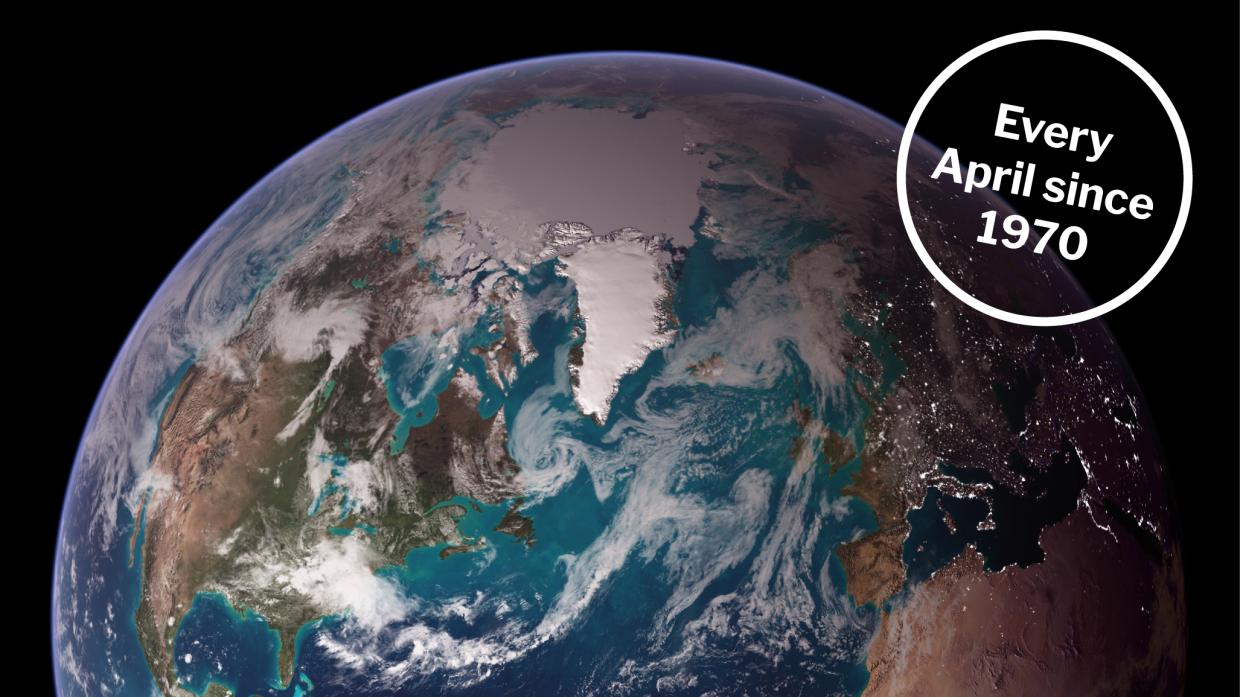
Celebrate Earth Day (April 22), Earth Week, and Earth Month!
Since 1970, Earth Day has increased awareness of the planet we live on, and encouraged people to learn more about pollution, climate change, endangered species, and many other environmental issues. Earth Week takes place during the week around Earth Day.
The NISE Network has compiled a selection of resources to help you plan your Earth Day celebration.
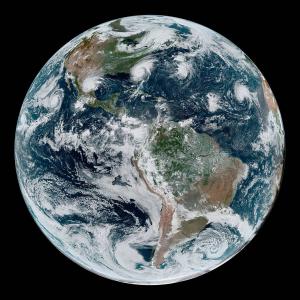
Collections of Public Engagement and Professional Resources Related to Earth Day
- Climate Change resources: https://www.nisenet.org/climatechange
- Energy resources: https://www.nisenet.org/energy
- Water resources: https://www.nisenet.org/water
- Air quality resources: https://www.nisenet.org/air
- Sustainability resources: https://www.nisenet.org/sustainability
NISE Network Hands-on Activities
Explore Science: Earth & Space toolkit resources
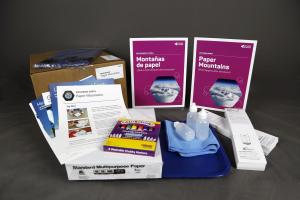
- Exploring Earth: Paper Mountains
https://www.nisenet.org/catalog/exploring-earth-paper-mountains-2018 - Exploring Earth: Investigating Clouds
https://www.nisenet.org/catalog/exploring-earth-investigating-clouds Exploring Earth: Rising Sea
https://www.nisenet.org/catalog/exploring-earth-rising-seaExploring Earth: Land Cover
https://www.nisenet.org/catalog/exploring-earth-land-cover-2019Exploring Earth: Temperature Mapping
https://www.nisenet.org/catalog/exploring-earth-temperature-mapping-2019
Sustainable Futures Resources (Learn more: https://www.nisenet.org/sustainable-futures)
- Watch and Create! Creativity For Sustainability hands-on activity
- Good Life Challenge activity
- Games for the Future set of three hands-on activities
- Survival: A Game Show about People, Planet, and Prosperity public program
- Ecosystem Engineers museum field trip
- Imagine Our Community 2100 forum
- Women's Rights and Sustainability teen forum
More NISE Network activities
Sustainability & Museums - Why Sustainability and List of Resources
https://www.nisenet.org/catalog/sustainability-science-technology-museums-resourcesSustainABLE kit (2016)
https://www.nisenet.org/sustainable-kitExplore Science: Let's Do Chemistry - Cleaning Oil Spills with Chemistry (longer program)
https://www.nisenet.org/catalog/cleaning-oil-spills-chemistryExplore Science: Let's Do Chemistry - What’s in the Water (longer program)
https://www.nisenet.org/catalog/whats-waterBuy It, Or Better Not? program
https://www.nisenet.org/catalog/buy-it-or-better-notMore NISE Network suggestions:
https://www.nisenet.org/seasons
Additional Resources for Planning Programs and Events
Earth Day
https://www.earthday.orgEarth Day Event Toolkit
https://www.earthday.org/earthdayinabox/Earth Day: 11 Actions for the planet during a pandemic
https://www.earthday.org/11-actions-for-the-planet-during-a-pandemic/National Environmental Education Foundation Environmental Education week resources
https://www.neefusa.org/education/eeweekNASA Museum & Informal Education Alliance Earth Day Resources for Informal Education
https://informal.jpl.nasa.gov/museum/earth-dayNASA Earth Day Site
https://science.nasa.gov/earth/earth-day/NASA Earth Day Toolkit
https://science.nasa.gov/earth/earth-day/earth-day-toolkit/NASA Earth Day Posters
https://science.nasa.gov/get-involved/toolkits/earth-day-postersNASA Earth Overview
https://solarsystem.nasa.gov/planets/earth/overview/NASA Space Place
https://spaceplace.nasa.gov/all-about-earth/en/Explore! Earth’s Climate
https://www.lpi.usra.edu/education/explore/earth-climate/NASA citizen science projects with GLOBE Observer (Learn more below in Citizen Science Opportunities)
https://observer.globe.govEnvironmental Protection Agency Community Resources
https://www.epa.gov/earthdayChemists Celebrate Earth Week (Learn more below in Chemists Celebrate Earth Week)
https://www.acs.org/content/acs/en/education/outreach/ccew.htmlSTARnet resources for libraries - "Our Planet: EARTH" Campaign (Learn more below in Library Resources)
http://www.starnetlibraries.org/our-planet-earth/- Climate Resilience, National Oceanic and Atmospheric Administration (NOAA)
https://www.noaa.gov/office-education/elp/resilience-assets - howtosmile collection of the best educational materials from Lawrence Hall of Science
https://www.howtosmile.org/topics - Educating for a Sustainable Future, from Shelburne Farms
https://shelburnefarms.org/our-work/resources
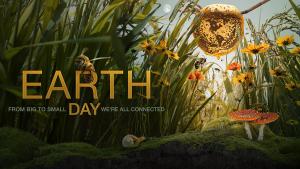
Posters
- NASA Earth Day Posters by Year
https://science.nasa.gov/toolkit/earth-day-posters/ - An Earth System View of Earthrise Lesson Plan — connected to the Earthrise Photo
https://mynasadata.larc.nasa.gov/lesson-plans/earth-system-view-earthrise - The Lunar and Planetary Institute (LPI) has created a series of four posters illustrating the link between Earth Day and lunar exploration; 8.5"x11" and 24"x36" versions
https://www.lpi.usra.edu/apollo50/index.shtml#resources - NASA Earth Mission Posters
https://science.nasa.gov/toolkit/earth-mission-posters
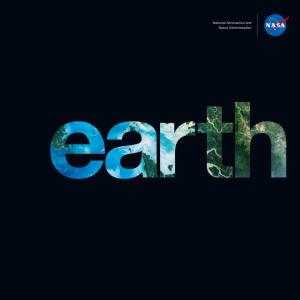
Images, Videos, Apps, and Interactive Media
- NASA Earth Multimedia & Galleries
https://science.nasa.gov/earth/multimedia/ - NASA's Lunar Reconnaissance Orbiter (LRO) captured a unique view of Earth from the spacecraft's vantage point in orbit around the Moon in 2015
https://www.nasa.gov/image-feature/goddard/lro-earthrise-2015 - NASA's Earth Minute Video Series from Jet Propulsion Laboratory
https://www.jpl.nasa.gov/edu/teach/activity/nasas-earth-minute/
https://www.youtube.com/watch?v=R8hh_l3l9Ao&list=PL9TFrgFq75552g7qVa-iTOeuo7Fy11o5f&index=1 (full playlist) - NASA Earth Expeditions
https://www.youtube.com/playlist?list=PLO0ZfOiXWrusueBK4VZsQEYCxuUZXDDko (full playlist) - NASA Space Place Earth Videos (for young children)
https://spaceplace.nasa.gov/menu/earth/ - Earth: A photo-essay from NASA’s Earth Science Division (E-book)
https://earthobservatory.nasa.gov/features/earth-book-2019 - Earth at Night (E-book)
https://www.nasa.gov/connect/ebooks/earthatnight_detail.html - NASA Earth Observatory image collection
https://earthobservatory.nasa.gov/images - NASA's Blue Marble (full Earth) image collection Earth Observatory image collection
https://visibleearth.nasa.gov/collection/1484/blue-marble
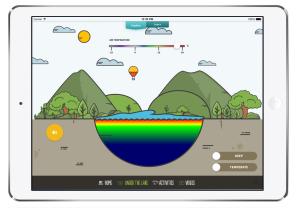
- Earth-Now App from Jet Propulsion Laboratory
https://apps.apple.com/us/app/earth-now/id494633346?ls=1 (iOS)
https://play.google.com/store/apps/details?id=gov.nasa.jpl.earthnow.activity (Android) - NASA Visualization Explorer App
https://svs.gsfc.nasa.gov/nasaviz/index.html - DIY Lake Science App with lake simulation interactive, activities, and videos (iOS)
https://svs.gsfc.nasa.gov/nasaviz/index.html - NASA Images of Change
https://climate.nasa.gov/images-of-change - Earth Science Interactives from PhET
https://phet.colorado.edu/en/simulations/category/earth-science
Use NASA Eyes to check in on all current NASA Earth missions.
https://eyes.nasa.gov/apps/earth/#/
Citizen Science Opportunities
Involve your audience in citizen projects that help scientists understand the Earth and its systems.
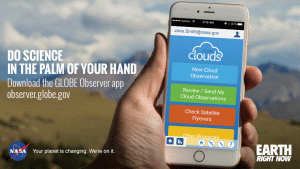
- SciStarter Citizen Science Resources
- SciStarter citizen science projects
https://scistarter.org - SciStarter - tips for citizen science from home
https://blog.scistarter.com/2020/03/you-can-celebrate-citizen-science-month-from-home/
- SciStarter citizen science projects
- GLOBE Observer
Globe Observer is an international network of citizen scientists and scientists working together to learn more about our shared environment and changing climate. Your visitors, camps, or colleagues can participate by downloading the GLOBE Observer app and submitting observations. Giveaway rack cards are included with the Exploring Earth: Investigating Clouds activity and showcase the four data observations experiences in the app.- https://observer.globe.gov
- https://observer.globe.gov/about/get-the-app
- Clouds—By photographing clouds, recording sky observations, and comparing them with NASA satellite data, you can help scientists gain a new perspective on clouds that satellites can't provide: from the ground looking up!
- Pair with a NISE Network hands-on activity: Exploring Earth: Investigating Clouds
- Land Cover—By photographing and classifying the land cover over an area the size of a soccer field, you will be assisting those scientists working to enhance global maps of land cover use.
- Pair with a NISE Network hands-on activity: Exploring Earth: Temperature Mapping
- Mosquito Habitat Mapper—By identifying potential breeding sites for mosquitoes, sampling and counting mosquito larvae, and using optional equipment to examine, photograph and identify the genus of your specimens, you will be enabling scientists to verify predictive models of mosquito population dynamics.
- Pair with a NISE Network program: Should We Engineer the Mosquito?" Forum
- Trees—The trees observation allows citizen scientists to measure tree height (and optionally tree circumference) to track the growth of trees over time.
- Clouds—By photographing clouds, recording sky observations, and comparing them with NASA satellite data, you can help scientists gain a new perspective on clouds that satellites can't provide: from the ground looking up!
- Zika Zine is a graphic story about how Aedes mosquitoes live and how to reduce the number of places where mosquitoes can survive. Readers will also find out how citizen scientists are helping NASA by documenting mosquito habitats with GLOBE Observer. The Zika Zine is an outreach resource of the GLOBE Zika Education and Prevention Project. A digital version can also be downloaded in multiple languages. You can also download the coloring pages and make your own comic guide.
- Digital Zika Zine: https://scied.ucar.edu/zikazine
- GLOBE Mission Mosquito Project: https://www.globe.gov/web/globe-mosquito-project
- Connect to a NISE Network program: Should We Engineer the Mosquito?" Forum
- Elementary GLOBE is designed to introduce students in grades K–4 to the study of Earth system science. Each module of Elementary GLOBE includes a science-based fictional storybook, three learning activities, and educator notes and glossary. Elementary GLOBE is a great option to extend your Earth science engagement efforts with young learners. Modules include: Air Quality, Climate, Clouds, Earth System, Season, Soils, and Water. A sample of the Do You Know That Clouds Have Names? storybook from the Clouds module is included in your physical toolkit and can be used with visitor groups before or after Exploring Earth: Investigating Clouds activity. Digital versions of all the modules, available in multiple languages, can be downloaded for free at the GLOBE website. Elementary GLOBE Modules:
- iNaturalist from Cal Academy and National Geographic (iOS, Android)
- NestWatch from Cornell Lab of Ornithology
- Earth Day - Global Earth Challenge
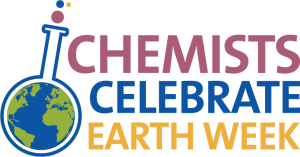
Chemists Celebrate Earth Week
- Chemists Celebrate Earth Week
The American Chemical Society (ACS) sponsors Chemists Celebrate Earth Week (CCEW) focusing on the role of chemistry in creating a better world. Resources include in person and virtual events, experiences, and activities.
https://www.acs.org/ccew - For NISE Network chemistry activities and resources please see
https://www.nisenet.org/national-chemistry-week
Library Resources
- STAR Library Network (STAR Net) is celebrating the important role that Earth plays in our lives with a special month-long campaign called, Our Planet: EARTH
http://www.starnetlibraries.org/our-planet-earth/ - STAR Net Our Planet: Earth Campaign recording
https://youtu.be/pK2bquCF6Gk?t=540
Museums across the country celebrate Earth Day
This partner highlight includes links to resources that are still available for anyone to adapt and use in their community:
https://www.nisenet.org/blog/museums-across-country-celebrate-earth-day
NISE Network Sustainability and Earth-themed Online Workshops (Recordings)
- Online Workshop: Activating Outdoor Spaces - Pocket Parks, Pollinator Gardens, and More! (2023)
Online Workshop: Earth and Space Resource Roundup - an Overview of All the NISE Network has to Offer (2022)
Online Workshop: Communicating Climate Change to Diverse Audiences (2022)
Online Workshop: Increasing Community Resilience to Extreme Weather and Environmental Hazards - The Citizen Science, Civics, and Resilient Communities (CSCRC) Project (2022)
Online Workshop: Learn about an opportunity to participate in a sustainability fellowship Part 1 & 2 (both workshops included sustainability projects from past fellows and how sustainability is related to participants' own organization).
Online Workshop 3-Part sustainability series about Sustainability in Museums (2020)
Sustainability in Museums Around the World: Working Together to Create a Sustainable Future (Part 1)
https://www.nisenet.org/catalog/online-workshop-sustainability-museums-around-world-working-together-create-sustainableSustainability and Museum Operations: Practices, Partnerships, and Resources to Help Your Organization Become More Sustainable (Part 2)
https://www.nisenet.org/catalog/online-workshop-sustainability-and-museum-operations-practices-partnerships-and-resourcesSustainability and Museum Visitors: Exhibits, Programs, and Other Ways to Engage the Public (Part 3)
https://www.nisenet.org/catalog/online-workshop-recording-sustainability-and-museum-visitors-exhibits-programs-and-other
Online Workshop: Celebrate Earth Day with NISE Net: Activity Connections and How Visitors Can Contribute Local Environmental Observations to NASA Science (2019)
Online Workshop: Changing the Conversation About Climate (2018)
History of Earth Day
- https://www.earthday.org/history/
- Rachel Carson inspiring Earth Day
https://www.womenshistory.org/articles/rachel-carson-inspiring-earth-day
Finding STEM Experts
- Finding and Collaborating with STEM Experts: see the "Space and Earth Science" and "Environmental Sciences" sections of the Working with STEM Experts: A Guide for Educators in Museums and Other Informal Learning Settings
